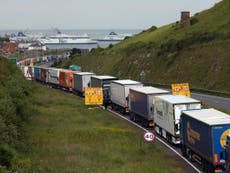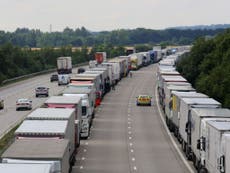Brexit: ‘Significant differences’ remain on trade deal after Boris Johnson talks with EU chief
Talks to resume on Monday with just 53 days to go to deadline
Your support helps us to tell the story
From reproductive rights to climate change to Big Tech, The Independent is on the ground when the story is developing. Whether it's investigating the financials of Elon Musk's pro-Trump PAC or producing our latest documentary, 'The A Word', which shines a light on the American women fighting for reproductive rights, we know how important it is to parse out the facts from the messaging.
At such a critical moment in US history, we need reporters on the ground. Your donation allows us to keep sending journalists to speak to both sides of the story.
The Independent is trusted by Americans across the entire political spectrum. And unlike many other quality news outlets, we choose not to lock Americans out of our reporting and analysis with paywalls. We believe quality journalism should be available to everyone, paid for by those who can afford it.
Your support makes all the difference.“Significant differences” remain in negotiations on a UK/EU trade deal after talks today between Boris Johnson and European Commission president Ursula von der Leyen, Downing Street has said.
But No 10 said that Mr Johnson will remain in “personal contact” with Ms von der Leyen over the crucial coming days as time runs out to avoid a damaging no-deal Brexit.
Major sticking points in the talks remain fisheries and Brussels’ demand for a level-playing field on standards to prevent the UK undercutting continental competitors.
Face-to-face talks between EU chief negotiator Michel Barnier and his UK counterpart Lord Frost will resume in London on Monday, with 53 days to go before Mr Johnson’s self-imposed deadline of 31 December to get an agreement or leave without a deal.
The UK has dismissed suggestions that Mr Johnson is keeping negotiations with Brussels on hold until the outcome of the US election is clear, amid speculation that victory for Joe Biden would effectively take the option of no-deal Brexit off the table.
In a statement, Downing Street characterised the prime minister’s phone talks with Ms von der Leyen today as “a stock take on the progress in the negotiations”.
“The prime minister set out that, while some progress had been made in recent discussions, significant differences remain in a number of areas, including the so-called level playing field and fish,” said the statement.
“The prime minister and president agreed that their negotiating teams would continue talks in London next week, beginning on Monday, in order to redouble efforts to reach a deal. They agreed to remain in personal contact about the negotiations.”
Ms von der Leyen said in a tweet: “We took stock of the negotiations with UK Prime Minister Boris Johnson today.
“Some progress has been made, but large differences remain especially on level playing field and fisheries. Our teams will continue working hard next week. We will remain in close contact in the next days.”
Ireland’s Europe minister Thomas Byrne today said that confirmation of Mr Biden as the new US president could inject fresh momentum into talks on a UK/EU trade deal.
Mr Byrne said it was now “absolutely essential” for London to comply with its obligations to take measures to avoid a hard border in Northern Ireland to clear the way for a trade deal by the end of the year.
Failure to get a deal would create “huge difficulties” for both sides and be bad for jobs in the UK and EU, he said.
Mr Johnson claims that Britain would “thrive” economically in a no-deal Brexit – which he refers to as an “Australian-style arrangement” because Australia has no trade deal with the EU – despite Treasury analysis in 2018 which suggested it could knock 9 per cent off GDP over the next 15 years.
Without a trade deal, the UK would be forced to fall back on World Trade Organisation terms requiring tariffs on a wide range of goods, such as 10 per cent on the price of a car.
Mr Johnson suggested on Friday that it was for Brussels to make concessions to break the current deadlock, saying there was “a deal to be done” if the EU was ready to move.
Asked if the UK could get a deal in the next 10 days, he said: “I very much hope that we will, but obviously that depends on our friends and partners across the Channel. I think there is a deal to be done, if they want to do it.”





Join our commenting forum
Join thought-provoking conversations, follow other Independent readers and see their replies
Comments